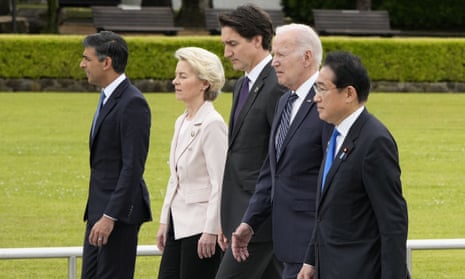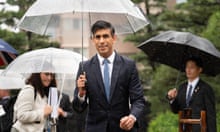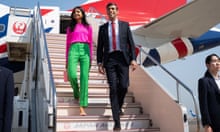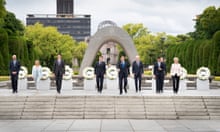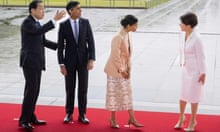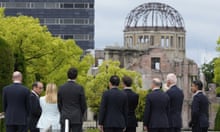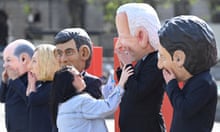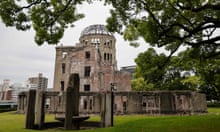The G7 has unveiled further sanctions targeting Russia over its war against Ukraine, as Volodymyr Zelenskiy prepared to attend the Hiroshima summit in person.
“Our support for Ukraine will not waver,” the G7 leaders said in a statement on Friday, vowing “to stand together against Russia’s illegal, unjustifiable, and unprovoked war of aggression against Ukraine”.
“Russia started this war and can end this war,” they said.
The Russian invasion of Ukraine was top of the agenda as G7 leaders gathered in Hiroshima, with Friday’s statement designed to underscore their resolve to support Ukraine and put pressure on Moscow.
The statement said: “Fifteen months of Russian aggression has cost thousands of lives, inflicted immense suffering on the people of Ukraine, and imperilled access to food and energy for many of the world’s most vulnerable people.
“We urge Russia to stop its ongoing aggression and immediately, completely and unconditionally withdraw its troops and military equipment from the entire internationally recognised territory of Ukraine.”
The G7 leaders said they were “renewing our commitment to provide the financial, humanitarian, military and diplomatic support Ukraine requires for as long as it takes. We are imposing further sanctions and measures to increase the costs to Russia and those who are supporting its war effort.”
The sanctions are designed to disrupt the Kremlin’s ability to get the materials it needs for the battlefield, close loopholes used to evade sanctions, further reduce international reliance on Russian energy, and narrow Moscow’s access to the international financial system.
The G7 countries reiterated their call on other countries to immediately stop providing material support to Russia’s aggression, “or face severe costs”.
While the leaders evaded a full commitment to a special international tribunal to try Putin for a so-called “leadership crime”, they did signal that Russia’s sovereign assets in G7 jurisdictions “will remain immobilised until Russia pays for the damage it has caused to Ukraine”.
Zelenskiy will reportedly arrive in Hiroshima on Saturday from Saudi Arabia, where he will attend the Arab League summit, and take part in talks the following day.
Oleksiy Danilov, the secretary of Ukraine’s national security and defence council, said: “We were sure that our president would be where Ukraine needed him, in any part of the world, to solve the issue of stability of our country. Very important things will be decided there and therefore the presence of our president … is absolutely essential in order to defend our interests.”
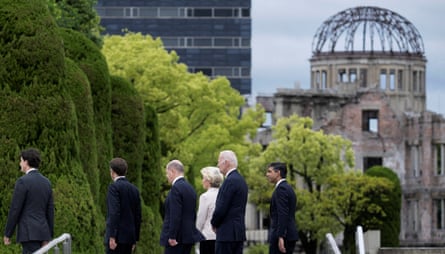
The Ukrainian president recently travelled to Italy, Germany, France and Britain as he stepped up calls for more international support before a planned counteroffensive.
“It’s important for the G7 leaders to hear directly from them about conditions on the ground,” John Kirby, the White House national security spokesperson, told reporters in Hiroshima. “He was always supposed to participate. It’s certainly that participation in whatever form it takes shows that the G7 takes seriously our mutual commitments to Ukraine’s self-defence.”
US sanctions would “cut off roughly 70 entities from Russia, and other countries, from receiving US exports by adding them to the commerce blacklist. And there will be upwards of 300 new sanctions against individuals, entities, vessels and aircraft,” a US official said.
The US and its allies, including the EU and the UK, have continued to ratchet up sanctions and export control pressure on Russia since the invasion began in February 2022.
While there was unanimity on Ukraine, disagreements on how to address China’s growing global influence could overshadow the summit, with a senior French official saying the three-day meeting should not turn into an “anti-Chinese G7”.
On Friday, Charles Michel, the European Council president, said it was in the EU’s interest to maintain “stable and constructive” cooperation with China, adding that the bloc would call on China to step up pressure on Russia to end its military aggression in Ukraine.
G7 leaders were expected to issue a statement with a section specific to China, listing issues that included “economic coercion and other behaviour”, a US official said.
Discussions will focus on how to warn the world’s second-biggest economy against what the G7 leaders see as its threat to global supply chains and economic security without alienating a powerful and important trade partner.
The EU wanted to “de-risk to reduce over-dependencies and diversify to address unfair practices”, Michel said. “Stable and constructive relations with China is in our mutual interest. Given its role in the international community and the size of its economy, China has a special responsibility in the world and it has to play by international rules.”
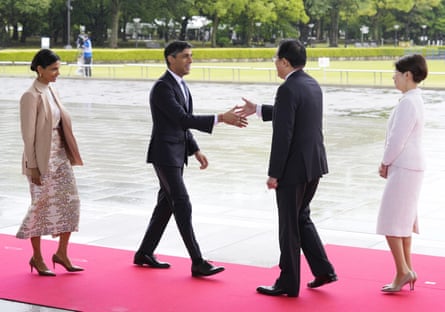
In the lead-up to the summit, Rishi Sunak announced a UK ban on imports of Russian-origin copper, nickel and aluminium, with other G7 members expected to follow suit. The British prime minister also set out sanctions targeting another 86 individuals and companies linked to Vladimir Putin, taking the total UK sanctions list to more than 1,500.
The UK will also ban the import of Russian diamonds – a ban that could prove largely symbolic unless it takes place in conjunction with other countries, as Britain has already imposed punishing tariffs of 35% on diamonds and metals from Russia.
On Thursday, an EU official said Russia’s multibillion-dollar diamond industry was a target for discussion. “We believe we need to limit exports from Russian trade in this sector,” the official said, adding that Indian involvement would be crucial to making any new measures work. India accounts for a large portion of the world’s trade in rough diamonds.
“We would like to engage in a dialogue with them, because the diamond industry is quite important in India,” the official said.
The Indian prime minister, Narendra Modi, is among several leaders from leading developing economies invited to the G7 summit as it tries to win over sceptical nations to its way of thinking on both Moscow’s war and China’s increasing sway in the world.
Reuters and Agence France-Presse contributed to this report
